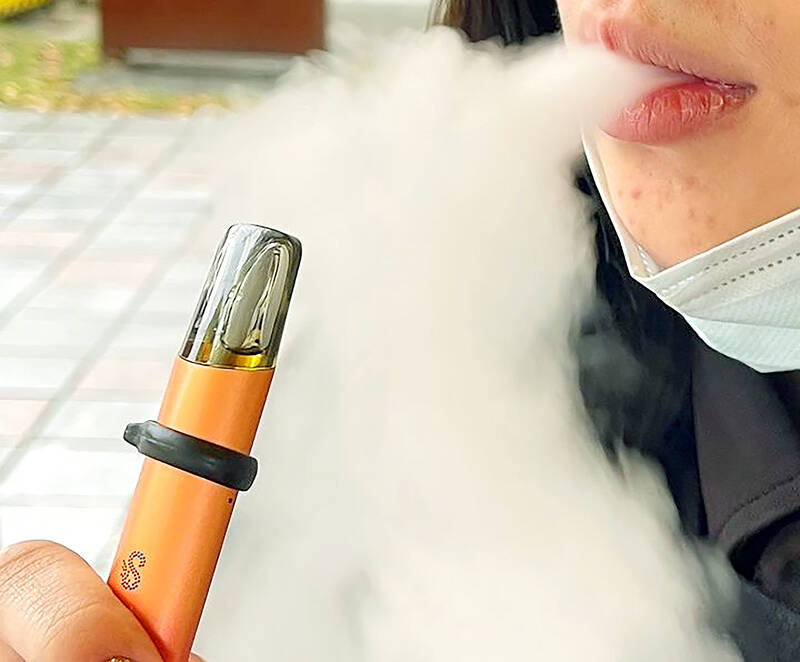Lawmakers yesterday approved the third reading of proposed amendments to the Tobacco Hazards Prevention Act (菸害防治法), which would require heated tobacco products (HTPs) to comply with the law, ban e-cigarettes and raise the legal age for buying cigarettes to 20.
People who use HTPs or e-cigarettes that are not approved by authorities would face a fine of NT$2,000 to NT$10,000 (US$65.66 to US$328.32), the amendments say.
Entities that sell or manufacture such products would be required to present samples of their products and necessary components, such as heaters for HTPs, when submitting health risk assessment reports, according to the amendments.

Photo: CNA
Tobacco products and related devices cannot be advertised or promoted in any way, nor can distributors claim they have passed health risk assessments, they say.
The amendments place e-cigarettes in the “cigarette-like product” category, effectively banning their use as well as the sale, provision or manufacturing of their necessary components.
Those who manufacture, import, provide or advertise tobacco products, or non-approved HTPs, would face fines of NT$10 million to NT$50 million, the amendments say.
Offenders who are not business owners would be fined NT$50,000 to NT$5 million, they say.
People who incur fines would be granted a grace period, after which they could be fined for repeat offenses, according to the amendments.
The amendments also ratify the WHO Framework Convention on Tobacco Control, and forbid tobacco companies or the manufacturers of necessary components from donating directly or indirectly to events, natural or legal persons or groups to promote or advertise their products.
Tobacco products must contain warning labels that cover at least half of the packaging, they say.
The amendments also ban smoking around all schools and childcare facilities.
The clauses on e-cigarettes and HTPs are to take effect one month after the amendments’ contents are announced to the public.
The clauses on vapes with additional flavors as well as regulations on packaging are to take effect one year after the amendments are announced.

SECURITY: As China is ‘reshaping’ Hong Kong’s population, Taiwan must raise the eligibility threshold for applications from Hong Kongers, Chiu Chui-cheng said When Hong Kong and Macau citizens apply for residency in Taiwan, it would be under a new category that includes a “national security observation period,” Mainland Affairs Council (MAC) Minister Chiu Chui-cheng (邱垂正) said yesterday. President William Lai (賴清德) on March 13 announced 17 strategies to counter China’s aggression toward Taiwan, including incorporating national security considerations into the review process for residency applications from Hong Kong and Macau citizens. The situation in Hong Kong is constantly changing, Chiu said to media yesterday on the sidelines of the Taipei Technology Run hosted by the Taipei Neihu Technology Park Development Association. With

A US Marine Corps regiment equipped with Naval Strike Missiles (NSM) is set to participate in the upcoming Balikatan 25 exercise in the Luzon Strait, marking the system’s first-ever deployment in the Philippines. US and Philippine officials have separately confirmed that the Navy Marine Expeditionary Ship Interdiction System (NMESIS) — the mobile launch platform for the Naval Strike Missile — would take part in the joint exercise. The missiles are being deployed to “a strategic first island chain chokepoint” in the waters between Taiwan proper and the Philippines, US-based Naval News reported. “The Luzon Strait and Bashi Channel represent a critical access

‘FORM OF PROTEST’: The German Institute Taipei said it was ‘shocked’ to see Nazi symbolism used in connection with political aims as it condemned the incident Sung Chien-liang (宋建樑), who led efforts to recall Democratic Progressive Party (DPP) Legislator Lee Kun-cheng (李坤城), was released on bail of NT$80,000 yesterday amid an outcry over a Nazi armband he wore to questioning the night before. Sung arrived at the New Taipei City District Prosecutors’ Office for questioning in a recall petition forgery case on Tuesday night wearing a red armband bearing a swastika, carrying a copy of Adolf Hitler’s Mein Kampf and giving a Nazi salute. Sung left the building at 1:15am without the armband and apparently covering the book with a coat. This is a serious international scandal and Chinese

COUNTERINTELLIGENCE TRAINING: The ministry said 87.5 percent of the apprehended Chinese agents were reported by service members they tried to lure into becoming spies Taiwanese organized crime, illegal money lenders, temples and civic groups are complicit in Beijing’s infiltration of the armed forces, the Ministry of National Defense (MND) said in a report yesterday. Retired service members who had been turned to Beijing’s cause mainly relied on those channels to infiltrate the Taiwanese military, according to the report to be submitted to lawmakers ahead of tomorrow’s hearing on Chinese espionage in the military. Chinese intelligence typically used blackmail, Internet-based communications, bribery or debts to loan sharks to leverage active service personnel to do its bidding, it said. China’s main goals are to collect intelligence, and develop a